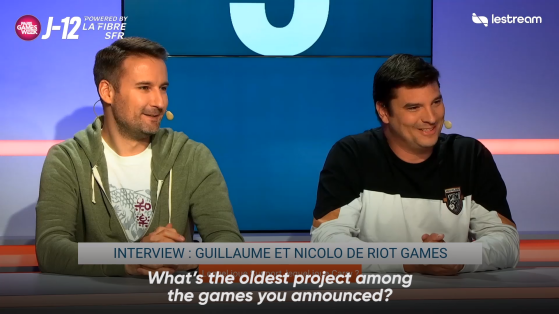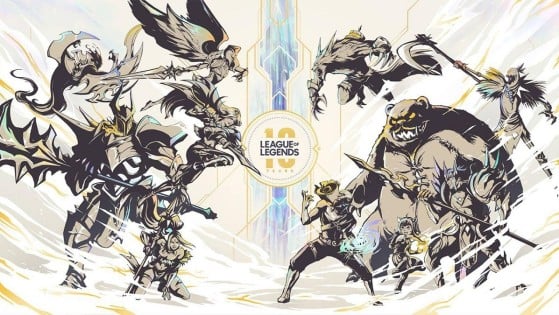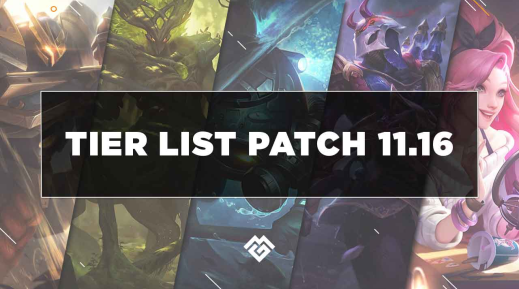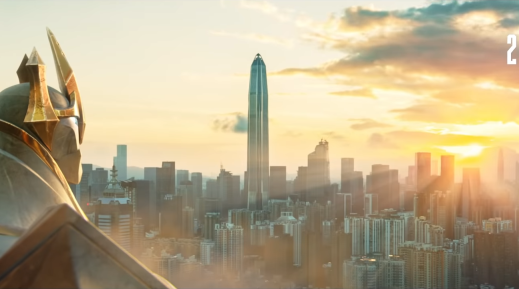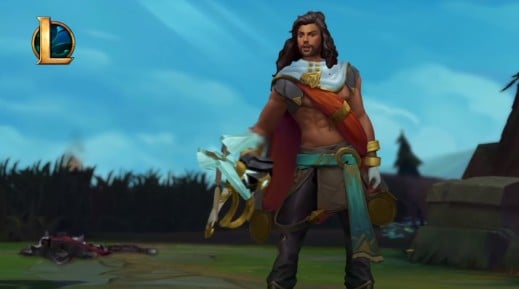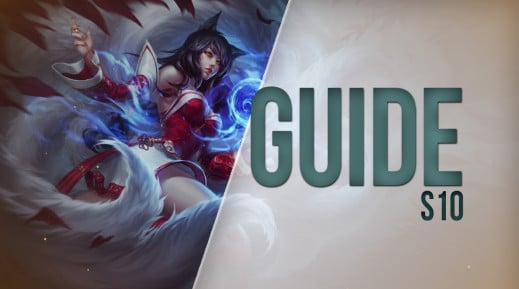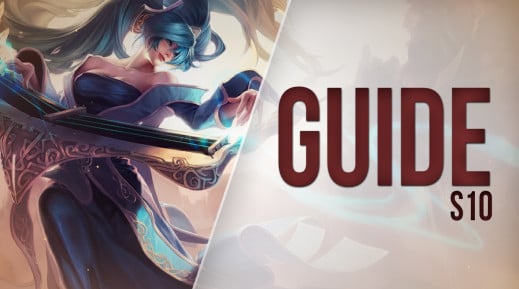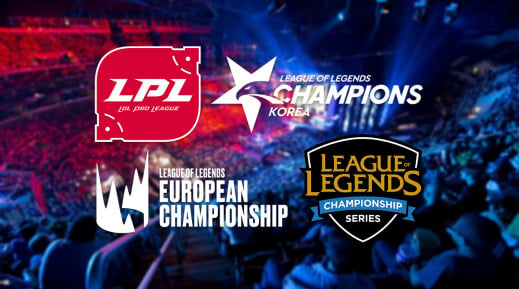Good afternoon fellow League of Legends players!
Our friends at Jeuxvidéo.com had the opportunity to interview Riot Games CEO — Laurent Nicolo — and it's our privilege to restitute his answers to you.
The tenth anniversary of League of Legends, the new announced games, and their relationship with Tencent — everything you've always wanted to know about your favorite studio is in this dedicated article!
- What’s the oldest project among the games you announced?
I’m not sure… l’d say that the first game genre we tried to develop was the card game. We started working on it really early… then we canceled it, and started it again. We changed the game, the team, the model. That’s pretty much the history of this game. That’s the first genre we started to work on, from 2010.
- From 2010?!
Yes, but considering the cancelation, the team changing… We’re developing the current version for roughly three or four years.
- Within Riot Games, how does it work along these years? How do you make your projects grow? Is it depending on the teams or the desires? Do you leave some projects in a corner, thinking they will grow by themselves? Or, perhaps you say: “2019 — this project needs to be released in Q2, end of the discussion”?
You can’t say:” that game needs to be done at this time”. You can do that if you’re developing a game that players will play for 10 or 20 hours: you focus, you know exactly what you want to do, … However, if you want a game that players will play hundreds of hours, thousands of hours, even decades… you need time.
Because players might think they found something good, they enjoy the game during 30-40 hours, but after two months… they get bored. They realize that the game they’ve been playing isn’t that good, that the meta is stale, and you need to start from scratch.
You need to leave these kinds of games to nourish themselves and we didn’t want to develop new games to the detriment of League of Legends.
I remember, just two or three months after releasing League of Legends, investors, candidates, partners were like: “so, what’s your second game?”. And I was answering them “When I ask players, they don’t want a second game. They want better champions, visual updates, better balance changes — they ask for a replay mode… We have a long list of things to do.
So we didn’t want to develop new games at the cost of League of Legends. We expanded the team working on it, and we built other teams made of enthusiasts alongside to develop these new games.
- Talking about MOBAs on mobile, the unchallenged king is obviously “Arena of Valor” or “Honor of King”. It’s published by Tencent, which is pretty much the same group as League of Legends...It’s quite fun to release a mobile version of League of Legends since it’s becoming a competitor of a ‘cousin’.
The deal with Tencent — because they bought Riot Games a few years ago — is that we operate independently of each other. They’re letting us do what we want, we’re developing the games that we want, they have no ideas of the games we’re developing. They have two chairs within the executive team, but they leave us managing the company as we want. We’re autonomous.
This is advantageous, especially when you’re creative and you want to develop the game you want. However, there is a drawback because sometimes they’re partners or competitors.
That’s the same for them! By the way, they don’t have one MOBA — more like six or seven. They have a dozen of FPS. That’s the way they manage their companies: they leave them autonomous and the best wins.
- There are a lot of questions and dreams about the relationship between western studios and Chinese publishers. So, obviously, everyone is wondering… Riot was historically one of the first American studios to exceed the simple partnership with China… How is it going with them? You just said that you were completely independent, but the adepts of the conspiracy theory will surely say “ahhh, we’re not sure…”
Do you have some discussions that are a bit more advanced or complicated?
The complexity linked to China isn’t the consequence of the governance — at least for us, and I’m almost certain that’s the same for other studios. The fact that shares of your company belong to a Chinese company doesn’t mean that you’re influenced. Along with the challenges that we had during the past years, we never had Tencent calling us. Most of the time, I personally phone them to keep them updated.
The real influence is the Chinese market. There are a lot of players in China that have different expectations, different sensitivity — here lies the difficulty. It’s true that it’s often misrepresented within the media… People imagine that Chinese government is pulling the strings but the people that are in the streets, people that are displeased aren’t politics: it’s the players. It doesn’t mean that there are no problems: it creates other problems. It’s precisely where sensitivity is more difficult. It’s not really about who owns your company — for that matter, we just saw it: one of the companies that were recently in difficulty isn’t owned at all by a Chinese company...
- What gave you the motivation to enter the fighting game world?
You made a reference to that earlier, we were motivated by our own teams. Games at Riot… We’re gamers, hardcore gamers who become developers and want to solve problems within a particular game. That’s how we created League of Legends. We were Dota fans, we saw all the problems, and we told ourselves:” the potential is huge, but it could be even better if we solved these problems, so let’s fix them.” We do exactly the same for the card game, and that’s exactly what the Cannon brothers did for the fighting game.
Plus, they have a corporate culture very similar to ours where you put creative people at the center of the company. At first, they came to us a few years ago because they loved our artists, our universe…
- Oh, we thought YOU came to them!
No, no, they came to us asking if they could use our universe… And through talking, we fell in love with each other and we just said: “come and make the game in our company.” We have a lot of talents that could help you where you’re struggling, we’re ready to sign paychecks, to invest and take that seriously. That’s how it happened.
- I would have a question about Legends of Runeterra. Currently, a great number of publishers tried to develop card games and pretty much failed — we have Valve, CD Projekt Red, Bethesda, that’s a lot already. Developing a card game seems to be a dicey challenge, did it influence you to see them burn their wings year after year?
Indeed, we watched carefully what the others were doing; we played a lot of different card games from other publishers…
- Even Artifact?
Perhaps a bit less than the others, but yeah we tried it too. We think that there are some problems to solve among card games. There is often a dubious meta with some unbalanced cards. That’s something we modestly learned to harmonize along our journey with League of Legends, thanks to regular balance updates. That’s a skill we would like to bring to the card game universe.
We also discovered that the economy was sometimes unbalanced, that you were spending a lot of money on these games and that it was directly impacting the gameplay. That’s also something we want to deal with. We want to allow players to create and customize their own decks either by spending money or by playing. You can unlock and get the cards you want without random effects. These problems are precisely the ones we want to solve with Legends of Runeterra.
- Can you already explain the game DNA itself? Or is it not 100% established yet?
To bounce back on what you said, we've been working on this project for quite a few years now. We've gained talent here and there. Former Call of Duty, CS: GO, or Destiny developers are working for us. We tried to create an expert team.
- There are veterans of these three major games who work for you after all.
Yes, totally. To be clear, our goal is to make a game where shooting really means something. All the abilities and powers you've seen are tactical ways to confuse the opponent. It can sometimes give you vision in-game, to have control over the environment, but in the end, what matters is shooting. The shooting works in two different ways. The first is from a gameplay perspective, so we spend a lot of time crafting an extremely accurate shooting system. You will have to be careful about everything: how you move, how you think... It is as much a game of reflection as it is a game of reflexes. That's how we describe it. The quality of the shooting is also expressed by the infrastructure, meaning anti-fraud, having the lowest ping possible — which is an issue we’ve addressed with League of Legends over time. We’ve invested a lot of money in it to crack Internet codes.
- Especially the tick rate.
Or the peeker's advantage for connoisseurs. We really want to make a game that isn’t only based on mechanics, nor reflexes. You’ll also have to be creative, to have your own playing style. There will be many ways to kill the opponent.
We want tactical gameplay. We want reflection. We want bluff. We want mind-games.
- And so lag is not in the picture.
It’s necessary that there is no lag. It has to be clean. It has to be neat. And so you think if you put your head behind the corner you're gonna get slaughtered. You know that if you keep your head behind the corner, you're gonna get slaughtered, so you have to think. You have to use your abilities. You have to bluff, make it look like you're here. That's the kind of game we're trying to create.
- Has the timing of these announcements been planned for a long time, i.e. 15 days before the BlizzCon? Was it intentional? Do you want to declare war on Blizzard? Or is it a pure coincidence?
To be honest, almost the entire company is a huge Blizzard fan. Let us be clear about that. When I hear these comparisons, that I didn't really plan for, I'm a little surprised. We’re touched by this because we really like Blizzard. I'm going to put things back into context: for the moment we've just announced games. Blizzard has been delivering things every time for 20 years. There may have been a game that didn't work so well, but overall they have had several successes in a row. We’ve made only one. We don't have Blizzard's resume yet, to be honest. On the opposite side, with the card game, yes there is a frontal competition. I don't think our other games are really in front. That answers your previous question.
- Regarding the FPS, we first thought a lot about Overwatch before we thought about CS: GO because of the powers, the champions... The reference of a shooter with powers is Overwatch.
In reality, I don't really think so. That’s true that we do a bit the same kind of game: online games, based on tracking, etc. On that there are tiny similarities but not that directly. As for the organization, this type of event should be planned very far in advance, almost a year in advance. We need to fix the beta, the development teams, and the event together. Assets must be ready. The press release teams must be able to communicate. The fact that we can talk about the games — not as much as you wanted — is not something that can be prepared two weeks in advance. I would like to see it prepared in two weeks, but it takes months and months.
And then simply — I cut you off — but to come back to the timing issue, on October 17 it's the 10th anniversary of League of Legends. We did this 10 days before so that there would be 10 days of gifts from the community.
- People often say that Riot doesn’t innovate or create. You copy, you improve. You do it more or less well according to people's tastes, but you don't create new genres.
It is true that if we look at all our games in development — but it is the same for the gaming market — we are trying to improve an already existing genre. Why? Nothing to do with the big man's strategy at the top. That's how we work. We’re game fans. We see some problems. We want to resolve them. I don't take it too seriously because it's a little true. That's not necessarily a bad thing. We have brought something new with League of Legends, and innovation isn’t necessarily linked to a new genre. You were talking about K/DA earlier. When it started it was a developer who told us "I have an idea. We're going to do a virtual K-Pop group in a video game company.
In most companies, the survival rate of this idea is zero.
- That's true.
We said, "let's do it!” We created the music, the skins, the video... We had a ceremony in augmented reality. This is where creativity is and not necessarily in making a new kind of game.
- How do you see yourself as a development studio in the next ten years?
I know that we’ve given a lot of information with our announcements. To be honest, we've only made one game in the last ten years. We’ll make some more over the next ten years. We're not going to make many games. You get the impression that many of them are coming because we announced everything at once in a 45-minute live stream. In reality, we’re not going to be a publisher like EA or Ubisoft that launches several games a year. We're going to launch a few games a decade. That's what we're going to do. However, when we start a project, we work hard. That's the idea of the company. In ten years, I’d be happy if there are some new types of game — card game, tactical FPS, fighting game — with their own “League of Legends” or the game that lasts and on which we can rely on. You can play it for years, not continuously, but you play it for a few years before you stop playing it. Then, you see an esports competition and you want to get back to it. It's this kind of game, being part of your life, that we're trying to make. If in ten years we can redo the same thing with one, two, or three other kinds of games, well, I'll be very happy.
